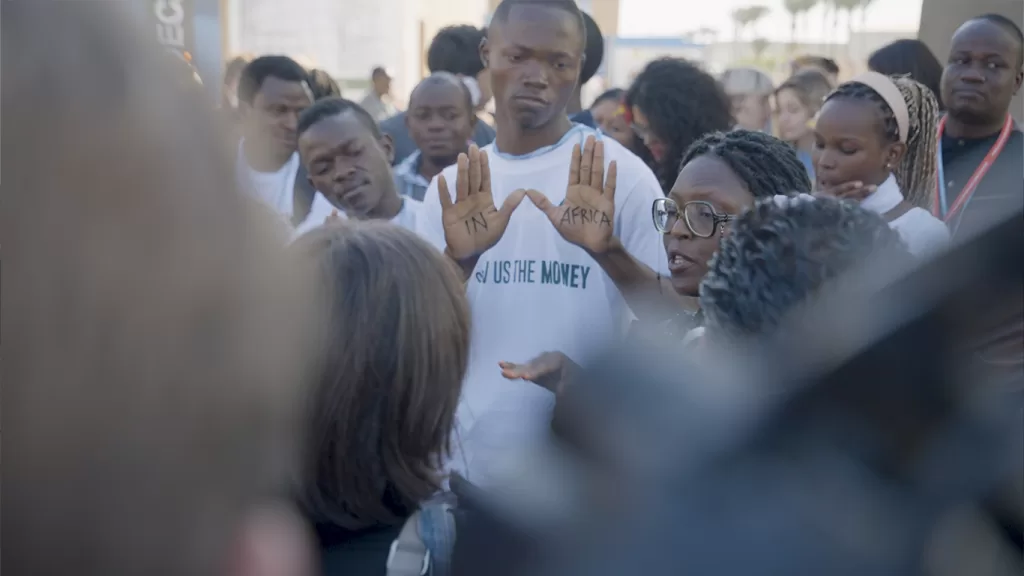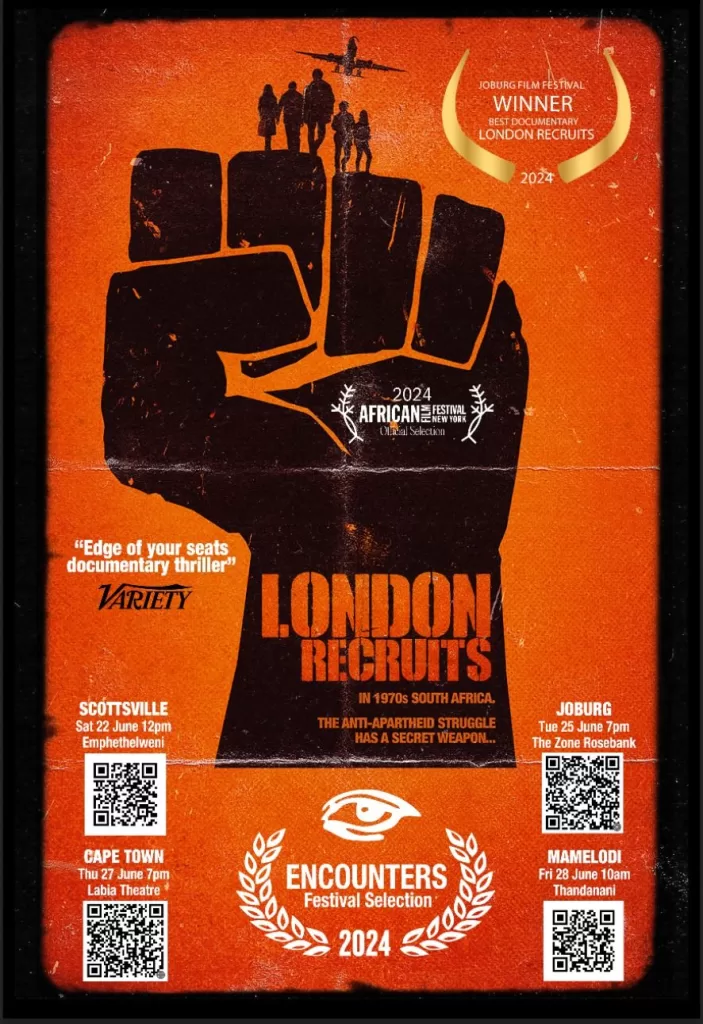Politics and climate activism, sports for people living with disabilities, art and poetry, municipal degradation, manufacturing, and truth and reconciliation – this sounds like a mixed bag of potential portfolios from the new National Assembly. Not. These are themes from some of the top-end films from South Africa, Africa, and beyond being screened at this year’s Encounters South African International Documentary Festival which opens this week on Thursday 20 June, and runs until 30 June at venues in Cape Town and Johannesburg.
Some highlights amongst the 50 shorts, and feature lengths being screened include:
Innovative and activism in the struggle against apartheid echoes in the brilliant documentary London Recruits (SA), directed by Gordon Main, tells the story of the more than 60 young white people who were recruited by the ANC in London in the late 60s and early 70s to assist with covert operations in South Africa. Fired up by the political radicalism of the era, the young idealists entered South Africa under the handling of London-based Ronnie Kasrils, their activities helping to revitalise the ANC underground in South Africa. The film provides a riveting account of what it must have been like for the young men and women who made the transition from swinging Londoners to undercover agents working for the ANC on the Southern tip of Africa.
Jacqueline van Meygaarden, Anita Khanna, and Rehad Desai’s Temperature Rising (SA) is set between the COP26 and COP27 climate conferences, following the lives of three climate activists as they tackle the climate crisis in Southern Africa, exposing the politics, barriers, and struggles activists face. The documentary is a call to challenge climate leadership and legislation, while enabling community resistance, education, and global mobilisation.
The Afrikaans film Raw (Rou) (SA), directed by Adriaan de la Rey, is a lamentation on the slow death of a South African rural town, Nthoroane, through an exploration of the myths, disasters, and miracles that surround the town’s history.
In Mark Kaplan’s The Return (SA) South African writer Heidi Grunebaum returns to the city of Hungen in Germany, from where her grandmother was forced to flee to escape the Holocaust. Connecting the dots between Nazism, the institutional racism and violence of apartheid, and the contemporary rise of the extreme right, the documentary argues that these forces of division and hatred have been lurking in the shadows since the end of the second world war, both in Germany and around the world.
Rollaball (SA) directed by Eddie Edwards follows two friends from Accra’s skate soccer team over a 10-year period as they live their dream of going from amateur status to players in an internationally recognised sport. Skate soccer is a game created by athletes living with disabilities. The documentary tracks these youngsters in the marathon effort made by a team from a back street taxi rank onto an international stage.
A quiet documentary that dives into personal and public histories Cape-Helena (SA), directed by Damian Samuels, evokes a sense of nostalgia for a place to which many have never been: St Helena Island. It explores the lesser-known history of the Island, a place where the narrator looks for answers on his ancestral past, but instead learns of the many other stories concerning colonialism, slavery, and war.
In Al Djanat, the Original Paradise (France/Burkina Faso/Benin/Germany), directed by Chloé Aïcha Boro., Boro returns to her home country of Burkina Faso following the passing of her uncle during his pilgrimage to Mecca, to document the familial disputes surrounding the inheritance of his Coulibaly estate.
Samar…Before the Final Picture (Egypt), directed by Aya Ellboudy, is set between Cairo and Dubai, exploring a story of resilience and healing through Samar, a victim of an acid attack who devotes herself to helping another woman who has suffered the same fate.

In an attempt to heal her trauma, Patricia Bbaale Bandak’s Death of a Saint (Denmark/Uganda) follows her poignant return decades later to her family home, where her mother was killed by intruders.
Made in Ethiopia (United States/Ethiopia), directed by Xinyan Yu and Max Duncan, looks at the universal conundrum as 30,000 much-needed jobs are created at an industrial park but could displace a local community in Ethiopia. Filmed over four years, Made in Ethiopia explores China’s significant yet misunderstood impact on Africa.
Joe Brewster and Michèle Stephenson’s Going to Mars: The Nikki Giovanni Project (USA) is a masterfully produced look at the life of hugely influential African American poet and activist Nikki Giovanni made instantly engaging by the presence of Giovanni herself. Exquisitely edited and infused with empathy, Going to Mars is a richly detailed portrait of a life driven by a commitment to duty, truth, and community.
Cinemas that will screen the 2024 Encounters’ line-up:
In Cape Town – Ster-Kinekor V&A Waterfront, The Labia Theatre
In Johannesburg – The Zone @ Rosebank, The Bioscope Independent Cinema
For more information go to: https://encounters.co.za/
Ticket booking links can be found here: https://linktr.ee/encountersdoc

Encounters is Supported and Funded by:
The City of Cape Town, Bertha Foundation, National Film and Video Foundation of South Africa, Al Jazeera Documentary, Institute Francais, Refinery, Goethe-Institut of South Africa, Mail & Guardian, Heineken Beverages, Rough Cut Lab Africa, DOK.fest Munich, Ladima Foundation, anima, Pressure Cooker Studio, Heinrich Böll Stiftung, Known Associates, German Films, Embassy of the Kingdom of Netherlands, SS NL, Cinema Solidarity, Documentary Filmmakers Association, Kamva Collective, The Video Store Podcast, the University of Cape Town and the Centre for Film and Media Studies, Mail and Guardian (Media Partner), UWC The Centre for Humanities Research, Climate Story Lab Southern Africa.





























